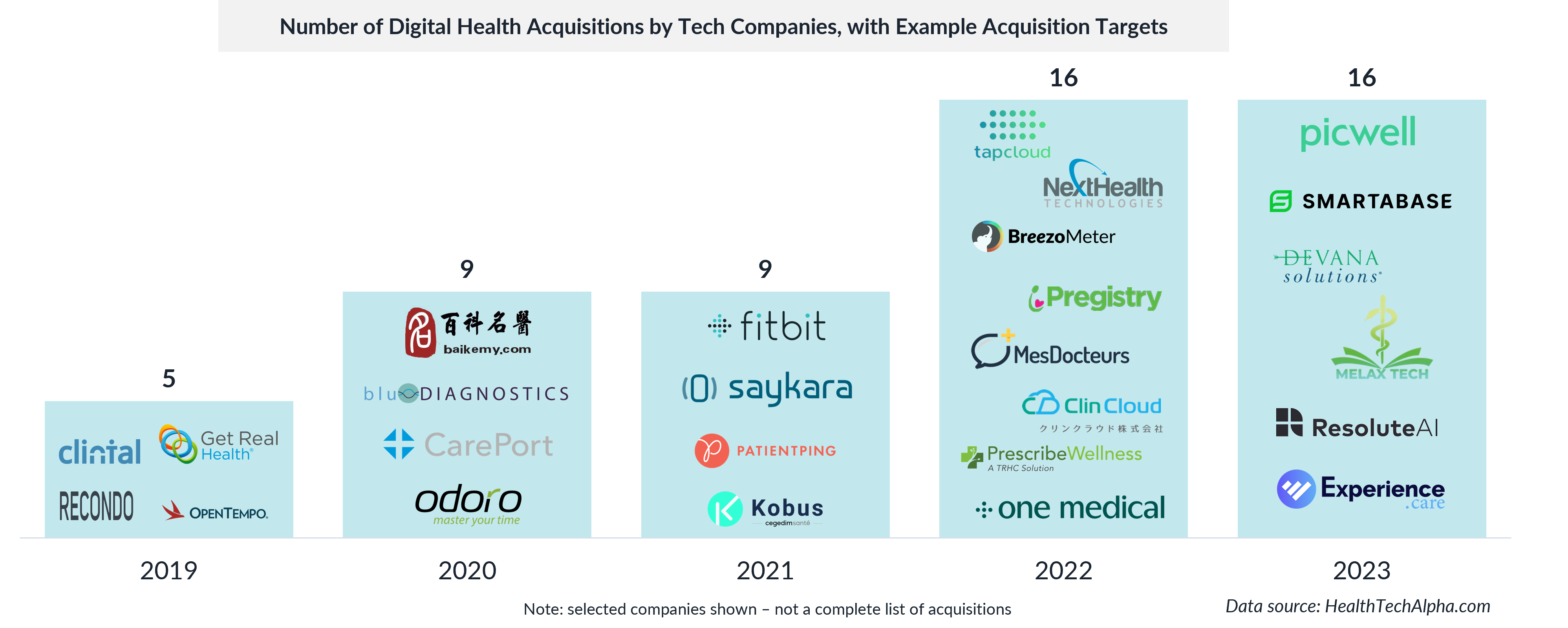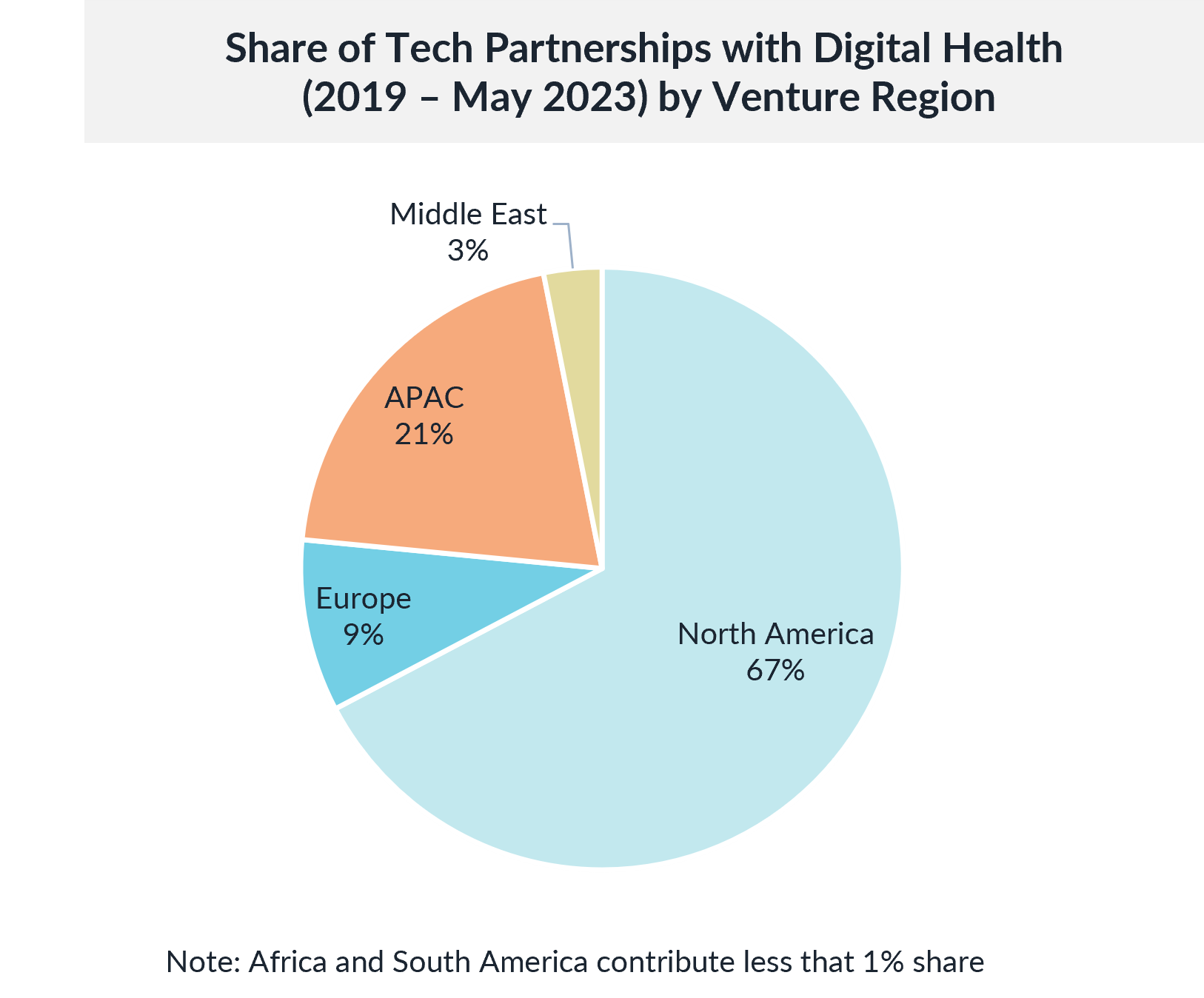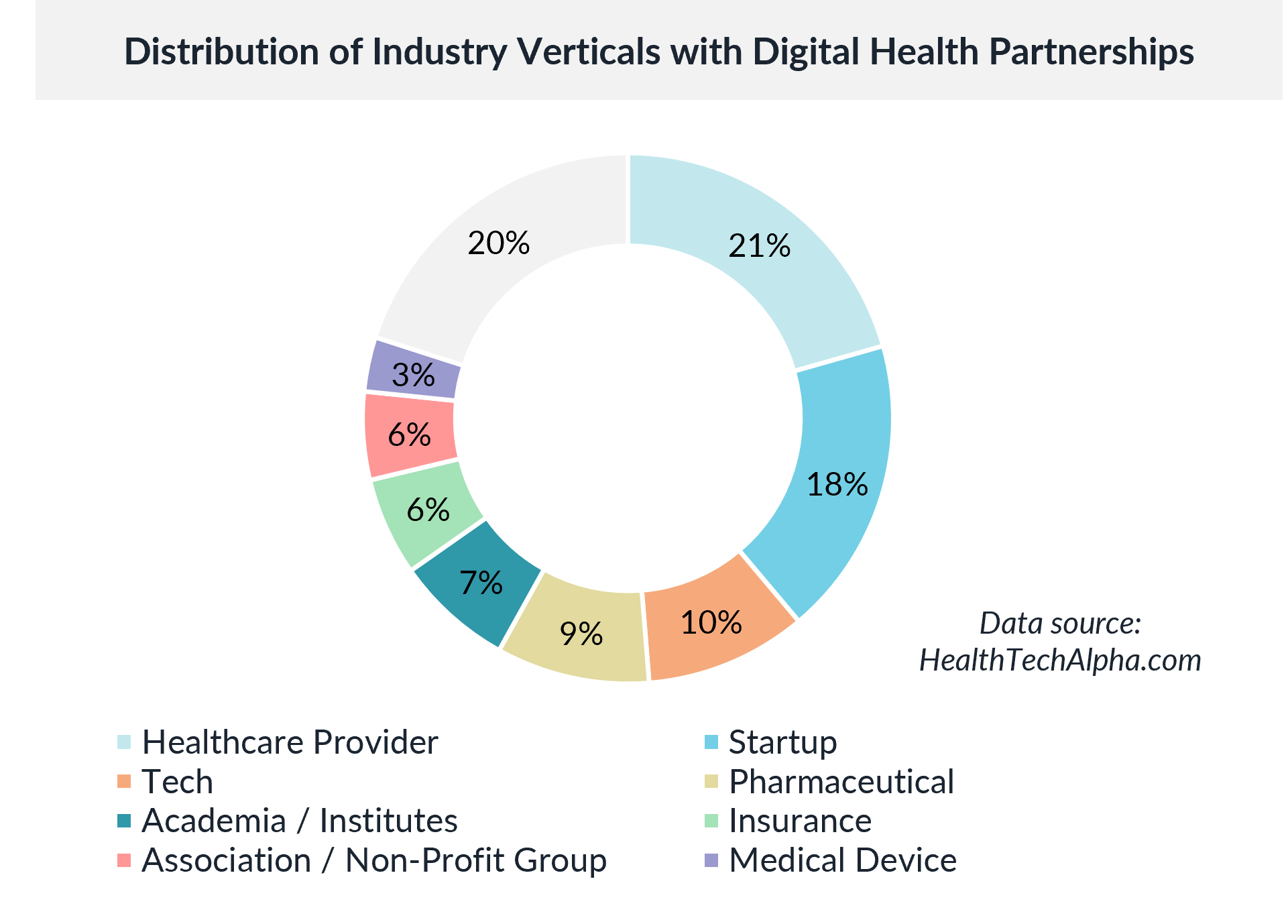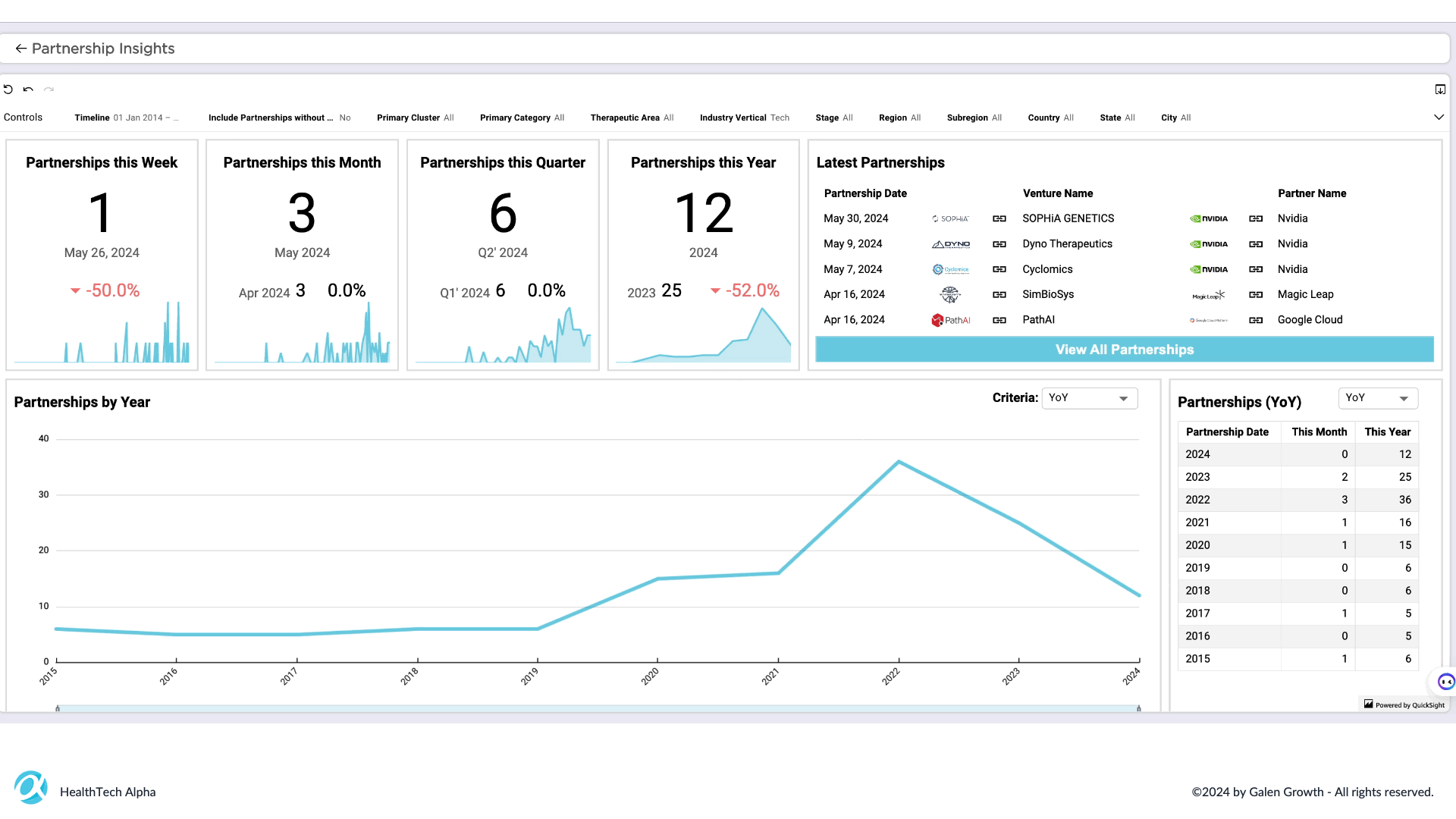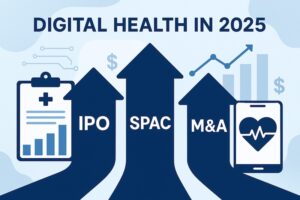The Digital Health landscape is rapidly evolving, with major technology companies like Amazon, Google, Apple, and Microsoft (collectively known as “Big Tech”) making significant inroads into healthcare. Over the past five years, partnership activity has reached a CAGR of 32%, putting the industry vertical in second place after the health system number of partnerships with digital health ventures.
However, the excitement of Big Tech in digital health is mixed with big questions: Who will own my data? Is my data safe? Will healthcare become more expensive?
Galen Growth has tracked tech companies’ activities in digital health, revealing that their entry into the healthcare domain brings exciting opportunities and complex challenges that warrant careful consideration from various stakeholders.
Patients
Considerations of the implications of new developments in healthcare must first consider the risks and benefits for patients. Most Big Tech firms have shied away from direct patient engagement, instead focusing their healthcare plays on areas like health data analytics, AI model development, and cloud infrastructure provisioning. However, despite the challenges, Amazon’s ventures into pharmacy distribution, with the acquisition of PillPack in 2018, and healthcare services delivery, with the acquisition of One Medical in 2022, are indicative of their intent to play a more direct role.
The growing presence of Big Tech in digital health offers both advantages and disadvantages for patients.
Advantages:
- Enhanced Experience. On the upside, integrated solutions from familiar consumer tech brands can enhance convenience and engagement, providing a seamless digital health experience.
- Personalised Care. In addition, Big Tech’s prowess in AI and analytics enables data-driven, personalised healthcare recommendations tailored to each patient’s needs, potentially improving outcomes.
Disadvantages:
- Privacy Concerns. Patients may have privacy concerns about sharing sensitive health data with technology giants and need assurances that robust security measures safeguard their information.
- Access Inequalities. There are also concerns about access inequalities, as underserved populations could be left behind if they are unable to leverage the benefits of digital health innovations. The geographic distribution of partnerships already indicates a strong tendency toward more developed countries, with ventures founded in North America capturing 67% of the partnerships over the past five years. Bridging the digital divide for underserved populations is crucial to ensure equitable access to Big Tech’s healthcare advantages.
Health Systems
The convergence of Big Tech and digital health presents both opportunities and challenges for health systems. On one hand, it offers access to cutting-edge technologies and seamless integration with consumer tech platforms. Conversely, it raises concerns over data privacy, security, and interoperability.
The top three clusters for partnerships between Tech and digital health ventures are focused on three areas that most affect health systems: Health Management Systems, Medical Diagnostics, and Population Health Management (including home healthcare).
Advantages
- Access to Cutting-Edge Technologies: Health systems can tap into Big Tech’s expertise in AI/ML, cloud computing, and data analytics. These technologies drive diagnostics, personalised treatment, and population health management innovation.
- Seamless Integration: Big Tech’s solutions can seamlessly integrate into consumer tech platforms, enhancing patient engagement and extending reach through widely used devices and apps.
Disadvantages
- Data Privacy and Security Concerns: Entrusting sensitive health data to Big Tech raises privacy and security questions. Transparency in data handling practices becomes critical.
- Interoperability Challenges: Proprietary Big Tech platforms may not easily share data with existing healthcare IT systems, and achieving interoperability remains a hurdle.
Health systems must carefully navigate this landscape, leveraging Big Tech’s capabilities while addressing data governance and interoperability concerns to deliver high-quality, patient-centric care.
Digital Health Ventures
4% of digital health startups across the globe are partnering with Tech companies, and this share increases with the use of AI and more advanced generative AI models. These startups must carefully evaluate the potential advantages and disadvantages of such partnerships:

Advantages:
- Leveraging Consumer Reach. Tech giants’ massive consumer reach and brand recognition can be leveraged, accelerating adoption through access to their vast distribution channels.
- Infrastructure Capabilities. Building on Big Tech’s robust AI, cloud, and data infrastructure enables rapid scaling, allowing startups to focus on innovation rather than building from scratch – data shows increasing algorithm complexity corresponds to more tech partnerships.
Disadvantages:
- Platform Dependence. There are risks in becoming overly reliant on Big Tech platforms, as software updates in algorithms could have regulatory implications, or unfavourable changes in contract terms could disrupt business models.
- Data Ownership and Monetization Challenges. Balancing data ownership rights while operating within tech-walled gardens is also complex, and monetising health data ethically requires a delicate balance.
Investors
The convergence of Big Tech and digital health presents investors with both opportunities and challenges. A balanced approach is crucial for capitalising on the digital health revolution while mitigating potential pitfalls.
Advantages:
- Brand Value and De-Risking Investments: On the upside, Big Tech’s powerful brand value and vast resources de-risk digital health investments to some extent, providing stability and credibility.
- Massive Upside Potential and Exit Opportunities: If deep-pocketed big tech players acquire portfolio companies in the digital health space, there is a massive potential upside and lucrative exit opportunity. Tech has been increasing digital health venture acquisitions year on year.
Disadvantages:
- Sustainability Concerns for Business Models: However, investors must navigate uncertainties. There are valid concerns over the long-term sustainability of business models heavily reliant on Big Tech’s platforms and ecosystems.
- Data Rights and IP Protection Challenges: Furthermore, data rights and intellectual property protection become critical challenges when digital health startups are backed by corporate investors from Big Tech giants.
Investors must carefully evaluate the opportunities and risks associated with Big Tech’s growing influence in the digital health domain. A balanced approach that leverages Big Tech’s strengths while mitigating potential pitfalls is crucial for capitalising on this rapidly evolving landscape.
Conclusion
The rise of Big Tech in healthcare presents exciting opportunities and complex challenges that require careful consideration from all stakeholders. While integrating cutting-edge technologies like AI, cloud computing, and data analytics holds immense potential for enhancing patient experiences, personalised care, and healthcare delivery, data privacy, security, interoperability, and equitable access must be addressed.
Ultimately, a balanced and collaborative approach that harnesses Big Tech’s strengths while upholding robust data governance, interoperability standards, and equitable access will be crucial to unlocking the full benefits of this convergence. Continuous dialogue, ethical frameworks, and regulatory guidance will play a pivotal role in shaping a future where digital health innovations, with contributions from Big Tech, prioritise patient-centric care, trust, and positive societal impact.
There is More to Discover
Explore the intersection of Big Tech and Digital Health in our comprehensive Global Digital Health Innovation Report. This report, powered by HealthTech Alpha, the leading Digital Health private market data, intel, and insights platform, uncovers the key focal areas for Tech companies in the Digital Health space, including partnerships and investment trends globally.
Understanding Big Tech’s investments and partnerships with Alpha Edge
With Alpha Edge on HealthTech Alpha, users can explore all partnerships between technology companies and Digital Health ventures in real-time. Alpha Edge is a tool that delivers real-time business intelligence insights created through filtered lists in HealthTech Alpha. Its ability to provide real-time data updates allows users to make informed decisions swiftly and confidently, ensuring they stay ahead of the curve in today’s dynamic Digital Health market landscape. By empowering users to visualize key metrics, track performance trends, and perform ad-hoc analysis, Alpha Edge streamlines the data analysis process, saving time and driving efficiency.


